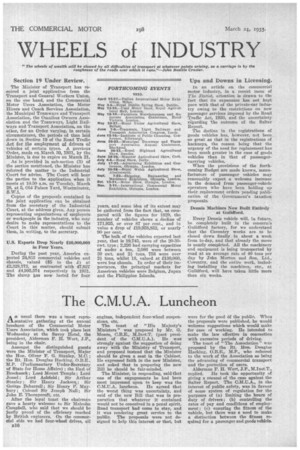The C.M.U.A. Luncheon
Page 30

If you've noticed an error in this article please click here to report it so we can fix it.
An usual there was a lmost representative gathering at the annual luncheon of ''the Commercial Motor Users Association, which took place last Wednesday at the Savoy Hotel, the president, Alderman F. H. Wort, J.P., being in the chair.
Amongst the distinguished guests were the Minister of Transport, Major the Hon. Oliver F. G. Stanley, M.C. ; the Rt. Hon. Douglas, Hacking, 0.B.E., M.P. (Parliamentary Under-Secretary of State for Home Affairs) ; the Earl of Breeknock; Lord Mount Temple; Lord Jessel; Lord Ashfield; Sir Arthur Stanley ; Sir Henry Jackson; Sir George Beharre-11; Sir Henry P. Maybury ; Colonel Sir Joseph Nail; Sir John E. Thornycroft, etc.
After the loyal toast the chairman gave a hearty welcome to Sir Malcolm Campbell, who said that we should be justly proud of the efficiency reached by British engineers. On the eominernial side we had four-wheel drives, oil engines, independent four-wheel suspensions, etc.
The toast of "His Majesty's Ministers" was proposed by Mr. G.
Monro, M.Inst.T. (past president of the C.M.U.A.). He was strongly against the suggestion of doing away with the Ministry of Transport, and proposed instead that the Minister should be given a seat in the Cabinet. He expressed faith in the new Minister, and asked that in preparing the new Bill he should he fair-minded.
The Minister, in responding, said that one of the engagements he had been most impressed upon to keep was the C.M,U.A. luncheon. He agreed that the worst thing was uncertainty, and said of the new Bill that was in preparation that whatever it contained would not be conceived in a penal spirit. Road transport had come to stay, and it was rendering great service to the public. The proposals were not designed to help this interest or that, but were for the good of the public. When the proposals were published, he would welcome suggestions which would make for vase of working. He intended to make the law effective in connection with excessive periods of driving.
The toast of "The Association" was proposed by the Rt. Hon. Douglas Hacking, 0.B.E., M.P., who referred to the work of the Association as being the advancing of commercial transport and the protection of users.
Alderman F. H. Wort, J.P., M.Inst.T.,
replied. Ile took the opportunity of giving a resume of the case against the Salter Report. The C.M.U.A., in the interest of public safety, was in favour of some system of regulation for the purposes of (a) limiting the hours of duty of drivers; (b) controlling the rates of pay and conditions of employment; (c) ensuring the fitness of the vehicle, but there was a need to make a distinction between the fitness required for a passenger and goods vehicle.




























































































